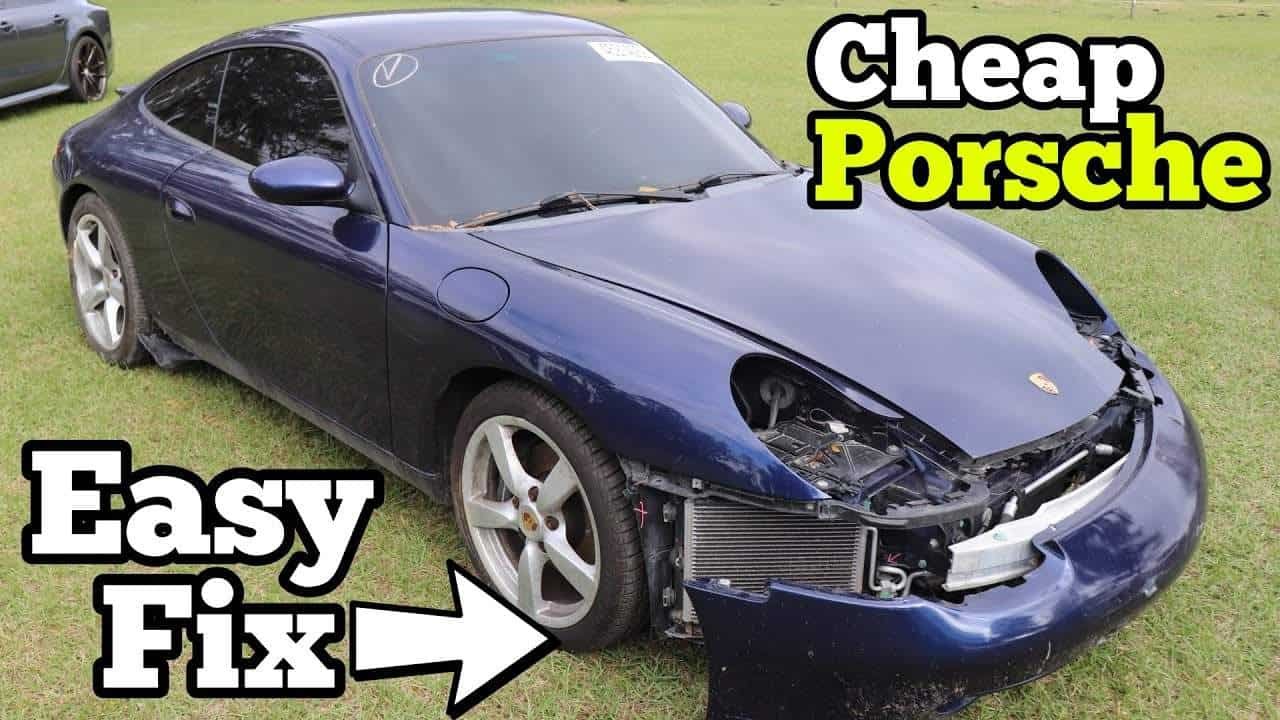Fixing Salvage Cars for Profit – Profitable or Not?
Is fixing salvage cars for profit profitable or not? Well, it is OK to flip salvage cars, especially when they require minor work and cosmetics. The repairs on a salvage or totaled cars begin with the rear wheel, the suspension, airbag replacement, and, of course, the paint job.
Flipping salvage cars for profit is highly profitable, just that it requires enough starting capital. It’s also challenging when you don’t have the experience. After each salvage car purchase, prepare surplus funds for fixing; you can spend even more if the seller is not clear on the engine condition. It’s typical when buying auctioned vehicles “as is”.
With no intention to discourage you, the panel of a salvage car can be inherently damaged. It’ll look like an integral part of a monocoque frame. You have to fit them with panel gaps, prime, and respray them with a similar shade as other panels. It seems easy, yeah, but can be completely worthless eventually.
Can you make money fixing salvage cars?

Of course, you can make money fixing salvage cars. Moreover, the amount you can account for yearly is not limited. You can mine for spare parts with a salvage vehicle, or flip it for a profit. The unfortunate aspect, however, is that it is unlawful to flip or resell a vehicle without disclosing that it is rebuilt from salvage. Besides, your jurisdiction may limit the number of cars you can sell without a dealer license yearly.
Most of the time, there is more profit to make buying a vehicle “as is”, but in a good condition. You can bid for the best salvage vehicle at the auctions, or even online. Meanwhile, you may refer to my articles on how to win an online car auction, and how to buy from the police auction.
The big loss is in restoring the salvaged vehicle to make it legal for the road. Furthermore, the time and effort may not be worth it if the return is low, or a loss. If the profit is substantial, then it’s OK to flip for the money.
How Do You Flip Salvage Cars for Profit?
Regardless of the risk in flipping salvage cars, the automotive industry witnesses massive salvage car flips yearly. Most cars are shipped to underdeveloped, or developing countries.
How do you flip salvage cars for profit?
Consider the tips below:
Discover the Sellable Market
In your jurisdiction, there ought to be the best automotive market to embrace. In California, for instance, models such as Toyota Camry, Honda Civic, and Toyota Prius are common. The Rav4, Honda Accord, and Mazda CX-5 are also commonly purchased. In this regard, if you are targeting buyers within California, you know what salvage cars to flip.
Meanwhile, you can begin a dealership license without a lot, and focus on flipping salvage cars for profit. Of course, you are not allowed to sell multiple vehicles with no lot.
Go to the Auctions
The auctions are the best places to buy salvage vehicles. You may be fortunate to purchase the best-conditioned vehicle; of course, repairs become cheaper.
Note that when a vehicle is not marked for public sale, it is a dealer-only vehicle. However, you can access dealer-only vehicles with my tips to buy from dealership auctions with no license.
Get the Older Vehicle
I flip salvage cars occasionally, and the wrecks are the least of my worries. Due to the geography and automobile consumers I target, I prefer older vehicles that need work from auctions and private sellers.
You may target the newer vehicles with no model updates in a while. Of course, used parts must be available; otherwise, airbags can kill the flipping venture for profit.
Following the experience, I recommend buying salvage cars hit from the front, and the cars hit from the back or other locations, then combine them and flip for profit.
Work the Vehicle
When the vehicle is ready, tow it to the mechanic. A mechanic that works at a low-cost is an advantage. You can rapport with the mechanic for subsequent deals and reasonable charges. Besides, the rule of thumb is that if the repair expenses exceed the actual value, it is worthless.
Get the mechanic to fix the rusts, paint the car, and ensure it is sound mechanical. The mechanic may replace the headliner and upholstery, and if the salvage car looks great, you can sell or flip them for profit.
Meanwhile, you may read my guide to get a totaled vehicle back on the road.
Complete Registrations
Budget the average of $200 for registration, depending on your state. You can evade the registrations, though. However, it is illegal, and it makes you a Curbstoner.
If you stop at this stage, the value of the vehicle depreciates greatly, and you may be losing.
Get Rid of the Rebranded Title
The most challenging aspect of fixing salvage cars for profit is getting rid of the rebranded title. Of course, no buyer wants to buy a rebuilt vehicle. A typical rebuilt vehicle is not safe, and subsequent damages can kill the vehicle completely.
To avoid boring you, I recommend reading my guide to getting rid of the salvage title. It is a simple process that involves illegal actions, though.
Figure Out a Suitable Market
Craigslist? Absolutely! But there is the Facebook market and eBay. I have no idea of the profit per hour, though. However, I’m certain it depends on your proficiency in swapping parts, scratch, paint, and few others. Make sure to detail the vehicle for higher bids.
How much is a salvage car worth?
A typical salvage brand, so far it reflects on the title, affects the value of a car negatively. Following the Kelly Blue Book® Value, the actual value of the vehicle drops by between 20 and 40 percent. However, you can have the rebuilt vehicle appraised by independent parties to get the market value.
Rolling Back Odometer Reading
The mileage on most salvage cars is typical “no, no”. Fortunately, you can rollback an odometer, especially on a vintage vehicle, or an older vehicle with a manual odometer.
I have covered the steps to roll back the odometer. Moreover, you can read how buyers detect odometer fraud to know what to do.
Rolling back the odometer to disguise the true mileage reading is illegal. If a buyer can establish the true reading, and it is confirmed that you falsified the odometer, you will be penalized.
How Do You Avoid the Selling Limit, Titling, and Registrations?
After acquiring the salvage cars, and working it out to taste, registrations and titling become challenging. To change the salvage title to clean, the vehicle must pass the smog check. Moreover, you can’t sell more than three cars a year, depending on your state.
Fortunately, you can evade the tedious practices legally by washing the title and jumping the title. To wash a car title means to get rid of the rebuilt branding, and sell the vehicle at a non-rebuilt value. By jumping or floating a car title, you skip entering the name of the previous owner(s).
When the car title contains no name, it is an open title, and you must sell it in a state with less-strict titling laws. Little wonder why most stolen and legalized vehicles are sold out of state, especially in states like Texas, Illinois, Georgia, North Carolina, and New Jersey.
How hard is it to fix a salvage title?
To fix a salvage title and flip for profit is quite hard, but not impossible. Go through your DMV’s requirements to change a salvage title to clean, or take the illegal route of washing the title to clean.
Is it worth repairing a salvage car?
Yes. However, it is not advisable if you are inexperienced. Besides, the insurance deems a salvage car a total loss, and would not insure the vehicle. Some insurers will accept the burden, but you are dealing with insurance premiums that can be expensive.
How much does it cost to rebuild a salvage title?
The cost of rebuilding a salvage title depends on the value of the vehicle and state. The risk is significant, and you might find latent damage not budgeted. The typical registration fee is about $100. You will pay additional fees such as the prior history fee and salvage and dismantled vehicle inspection fee.
Should You Flip Salvaged Cars for Money?
Fixing salvage cars for money is different from flipping sound cars for profit. If you are in for the short term, expecting huge profit, it is not too late to withdraw. I have flipped salvaged cars for a while (collision shop), I have been fortunate with the perfect builder. The salvaged cars turn out clean, but the problem arises when buyers begin to cut corners.
Expect to spend high on repairs. Of course, you are dealing with salvage cars, and it is worth it. Meanwhile, the liability is evolving for the worse, and you get sued easily for failing to work to OEM standards with documentation.
Understand that a salvage car is an unsafe car; it exposes the driver and passenger to death at the slightest crash. While fixing the salvage cars for profit, do not hoard the money, and follow the procedures to realize a solid car for sale.
Builders save money, but if you repaired the vehicle personally, you save on labor, but it is not advisable. Meanwhile, when a salvaged vehicle is not fixed properly before flipping, you are liable and may be sued in the region of millions for wrongly (by manufacture standards) repairing.
- 10 Common Mistakes When Bleeding Brakes - September 12, 2023
- Dash Cam That Records When Car is Off [5 Best] - September 11, 2023
- How to Know if Dash Cam is Recording [10 Methods] - September 8, 2023




